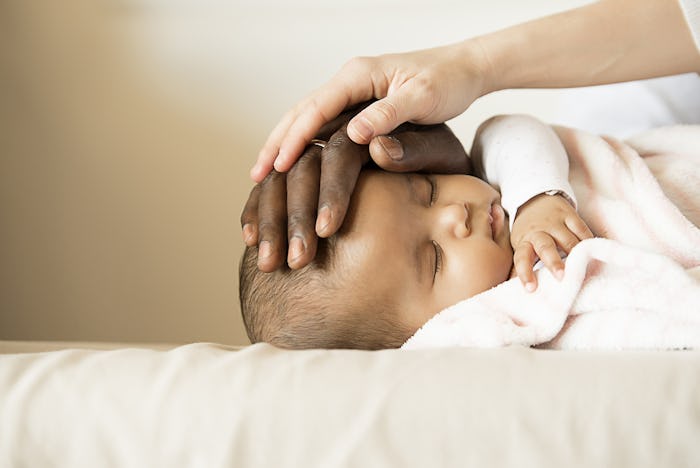Life

The Difference Between Co-Sleeping & Bed-Sharing
When the topic of babies and sleeping arrangements are being discussed, the terms "co-sleeping" and "bed-sharing" are used interchangeably. Not only is this incredibly confusing, but it's extremely inaccurate. Although it may seem slight, the one major difference between co-sleeping and bed-sharing is evident when you take a deeper look.
Each term has it's own meaning and makes for two different nighttime sleep experiences. Although both options offer a close proximity to your baby in the wee hours, one approach is a little more cozy than the other. According to Kid's Health, the differences between co-sleeping and bed-sharing are clear cut, but it's easy to see how people get their wires crossed when using these two terms. So if you've been seeking clarification and want to be precise, here is what you need to know.
Bed-sharing is when the baby is brought into the adult bed to sleep with the parents, as the website for USA Today explained. Often referred to as the "family bed," this option is the more controversial of the two since it can pose safety risks. According to the American Academy of Pediatrics, bed-sharing poses the highest risk for infant related deaths. Unfortunately, parents using a family bed do not always follow safe bed-sharing practices, such as removing pillows, sheets, and other objects that create an unsafe sleep environment for infants, according to What To Expect's website. Choosing bed-sharing with your baby means taking every precaution possible to eliminate all the risks.
Co-sleeping is when a parent is within arm's reach of the infant, but doesn't necessarily mean they share the same bed, according to the website Very Well. This is the main difference: co-sleeping is when the baby is close by, but sleeping in a separate space, just for him. This could be a regular bassinet, or a special co-sleeper bassinet that scoots up right nest to an adult bed. It could even mean the crib is in the parents' room as well. As Dr. Sears's site pointed out, there are still necessary precautions to take when using a co-sleeper near the parent bed. Skip co-sleeping on nights you've been drinking alcohol or are exhausted from sleep deprivation. Both of these factors inhibit proper care of your baby at night, and increase risks.
It may feel like splitting hairs, but there is one major difference between co-sleeping and bed-sharing. However, the most valuable point to focus on, is that no matter what you call it or how you choose to sleep, the baby's safety should always be your number one priority.